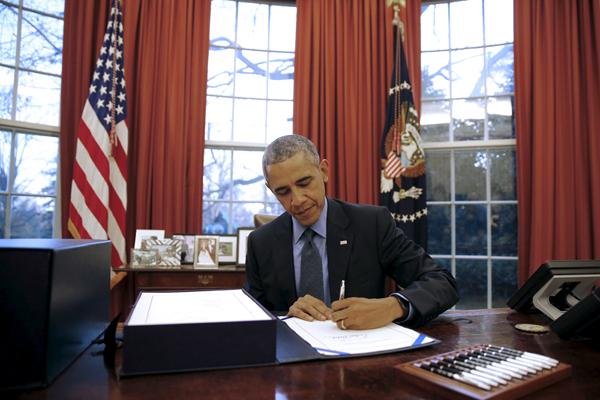You are here
Emerging powers rise in IMF as US unblocks reforms
By Agencies - Dec 19,2015 - Last updated at Dec 19,2015

US President Barack Obama signs the $1.1 trillion government funding bill into law at the Oval Office at the White House in Washington on Friday (Reuters photo)
WASHINGTON — China, India and Russia will soon speak with a louder voice at the International Monetary Fund (IMF).
After years of opposition, the US Congress has dismantled the final barrier to reforms that will give the emerging-market powers more say in the affairs of the 188-nation global crisis lender.
The IMF reforms are part of a $1.1 trillion spending package approved by Congress on Friday, and signed into law by President Barack Obama.
Adopted in 2010 by the international community, the reforms were expected to take effect in 2012.
But with the United States holding by far the largest share of voting rights at the IMF, Congress' refusal to approve the reforms had held up their implementation, to the consternation of IMF management and members.
The blockage has been a sore point between President Barack Obama's Democratic administration and the opposition Republicans who control Congress.
Republicans had rejected the slightest favourable gesture towards the multinational organisation, the object of some criticism in Washington for its largesse toward Greece.
In recent years, international summits have unfailingly included a pointed reminder about the stalled reform process — seen as all the more frustrating since the United States was among the first countries to call for an IMF overhaul in 2010 amid the global financial crisis.
At the end of their last summit in mid-November in Turkey, the Group of 20 economic powers said in a statement that they "remain deeply disappointed" with the delay in reforms and "we urge the United States to ratify these reforms as soon as possible".
The long stall also led the so-called BRICS — Brazil, Russia, India, China and South Africa — to set up an economic alternative, launching in July 2014 their own monetary fund and development bank.
The US approval will likely ease their frustrations with the 70-year-old IMF, dominated by the US, Europe and Japan, as well as remove a major headache for the Obama administration.
"The IMF reforms reinforce the central leadership role of the United States in the global economic system and demonstrate our commitment to maintaining that position," US Treasury Secretary Jacob Lew said in a statement.
IMF credibility on line
The reforms, however, are crucial for the IMF itself. They double the crisis lender's permanent financial resources, known as quotas, to some $660 billion.
The green light by Congress thus paves the way for the IMF to abandon some makeshift mechanisms it had adopted to keep its finances afloat and finance rescues of members in crisis.
But above all, it allows the Washington-based institution, founded in 1945, to better reflect the current interconnectedness of the world economy, exposed in stark relief during the 2008-2009 global crisis.
The measures slightly reshuffle the IMF executive board by reducing the representation of advanced economies, particularly in Europe, to give a greater voice to dynamic emerging powers.
Currently China, the world's second-largest economy, has less than 4 per cent of voting rights at the IMF, only slightly less than Italy whose economy is five times smaller.
After the reforms are implemented, China will see its voting rights nearly double to over 6 per cent, the largest gain. For example, India's weight will rise from 2.3 per cent to 2.6 per cent.
The US action also hands a personal victory to the managing director of the IMF, Christine Lagarde, who has been pushing hard for the changes to preserve the credibility of the fund.
Lagarde once joked she would "do belly-dancing" if needed to get US ratification.
"The United States Congress approval of these reforms is a welcome and crucial step forward that will strengthen the IMF in its role of supporting global financial stability," Lagarde said.
Still, the reforms will not resolve all the representation problems at the IMF. With 16.5 per cent of voting rights, the United States remains the largest stakeholder and continues to hold veto power.
"The IMF reforms remove a stain on the institution's legitimacy," Eswar Prasad, a former IMF official, said. "However, the scars caused by the protracted delay in having these reforms ratified and put into operation will not be easily erased.
Also on Friday, The US Congress voted to repeal the 40-year-old ban on exporting US crude oil in an energy policy shift sought by Republicans as part of a bipartisan deal that also provided unprecedented tax incentives for wind and solar power.
The Senate, on a 65-33 vote, approved lifting the ban and providing five-year extensions of tax breaks to boost renewable energy development as part of a $1.8 trillion government spending and tax relief bill.
The House of Representatives passed legislation containing the energy provisions earlier in the day by a 316-113 tally.
The energy deal was hammered out in secret talks among congressional leaders over two weeks.
Senators Lisa Murkowski, a Alaska Republican, and Democrats Heidi Heitkamp of North Dakota and Martin Heinrich of New Mexico had worked for more than a year to get the deal.
Democrats who backed the deal asserted that its provisions encouraging renewable energy were important for combating global climate change.
"This is the biggest deal for addressing climate change that we are going to see," Heinrich said in an interview.
Heinrich added that Democrats may not have been able to get a better deal even if they controlled both chambers of Congress, now led by Republicans. Many Republicans have opposed Democratic proposals to address climate change.
Congress, concerned about US dependence on imported oil, imposed the crude oil export ban after the Arab oil embargo of the early 1970s that sent gasoline prices soaring and contributed to runaway inflation. Arab members of the Organisation of the Petroleum Exporting Countries (OPEC) imposed the embargo following the US decision to re-supply the Israeli military during the 1973 Arab-Israeli war.
Drillers have said lifting the ban would increase US oil security and give Washington's allies in Europe and Asia an alternative source of crude beyond OPEC and Russia. The bill could benefit oil companies including Exxon Mobil Corp., ConocoPhillips and Chevron.
Opponents of lifting the export ban said the action would harm the environment and could lead to an increase in fiery derailments of crude-carrying trains.
Due to a global glut in oil supplies, lifting the ban is not expected to lead to significant US export shipments for months or even years, but could give crude producers the increased flexibility they coveted.
Oil boom
Drillers said continuing the ban would choke a boom in shale oil production since 2008 particularly in North Dakota and Texas that has pushed domestic oil prices down from more than $100 a barrel to below $40.
Lifting the ban was "particularly important at a time when our industry is experiencing a period of extreme volatility and uncertainty", Ryan Lance, chairman and chief executive officer of ConocoPhillips, said in a statement.
House Democratic leader Nancy Pelosi and some others in her party had expressed concern that allowing US oil exports would hurt independent refiners by raising the price of domestic crude to international prices.
Tom O'Malley, executive chairman of refiner PBF Energy, said lifting the ban would lead at least one East Coast refinery to shut down, adding that his refineries in New Jersey and Delaware are less exposed.
"This is a crazy thing to do," O'Malley added. "Once you lift it, it's hard to reverse it."
Democrats in the Senate had secured some protections for independent refiners, allowing them to deduct transportation costs for gasoline and other fuels they make.
Pelosi on Friday said Democrats walked away with a victory, in the trade of oil exports for environmental goals.
She indicated that the environmental damage from exporting oil would be offset by 10 times because of measures in the bill such as the renewable power tax credits, funding of a parks conservation fund paid for with oil revenues and the elimination of measures that would have dismantled Obama's clean power rules on power plants.
"Now that we have leveled the playing field, the United States finally has an opportunity to compete and realise our nation's full potential as a global energy superpower," said George Baker, head of Producers for American Crude Oil Exports, a group that formed last year to press lawmakers to open the trade.
At more than 2,000 pages long, the spending portion of the bill funds the government through next September, preventing a shutdown and effectively taking difficult budget disputes off the table as the 2016 presidential campaign enters the primary season.
Most of the US senators running for the White House voted against the bill, including Republicans Ted Cruz and Rand Paul and Democrat Bernie Sanders. Republican Lindsey Graham voted in favour. Republican Senator Marco Rubio, who had been criticised by campaign rivals for missing votes, was absent from Congress on Friday.
Dozens of previously temporary tax breaks will now be permanent under the tax segment of the bill, which will cost $680 billion over 10 years and was promoted by corporate lobbyists and low-tax Republicans.
Middle-class Americans also gain. Students, low-income parents and teachers will receive tax aid, attracting support for the legislation from the White House and congressional Democrats.
"I'm not wild about everything in it," Obama said of the legislation. "I'm sure that's true for everybody. But it is a budget that, as I insisted, invests in our military and our middle class without ideological provisions that would have weakened Wall Street reform or rules on big polluters."
Deficit worries
Some Republicans worry that the $1.15 trillion spending provisions add to the federal budget deficit and erode the fiscal discipline that House Republicans have championed, particularly since lawmakers aligned with the conservative Tea Party movement did well in 2010 congressional elections.
But Tea Party momentum has slowed as the federal deficit drops from its peak of $1.41 trillion in 2009 due to the economic recovery. The deficit was $439 billion for the fiscal year that ended on September 30.
The congressional Joint Committee on Taxation estimates the legislation passed on Friday will increase the 2016 fiscal year budget deficit by $157 billion and by $95 billion in 2017.
Tim Huelskamp of Kansas, a leading House Republican fiscal hawk, said the bill was "an early Christmas present for Donald Trump", the billionaire businessman seeking the Republican presidential nomination, because it will fuel the anti-establishment mood in the country.
Conservatives complained that Republican leaders agreed on the bill's spending and tax provisions behind closed doors and then rushed the bill through the Senate on Friday morning.
"A rotten process yields a rotten result, and this 2,000-page, trillion-dollar bill is rotten to its core," Republican Senator Tom Cotton of Arkansas said. "Corporate lobbyists had a field day, but working Americans lost out."
Some Democrats criticised the tax cuts, saying they give more aid to large corporations and wealthy business owners than to working families.
The largest component of the tax package is the business research and development tax credit, which will cost $113 billion over a decade in lost government revenues.
Related Articles
WASHINGTON — The Federal Reserve (Fed) hiked interest rates for the first time in nearly a decade on Wednesday, signalling faith that the US
WASHINGTON — US President Barack Obama early Friday won congressional passage of legislation that lifted the threat of a default on governme
US President Barack Obama pledged Wednesday to work with Republican lawmakers after their midterm election win but warned he would act without them to protect his core agenda, starting with immigration reform.

















